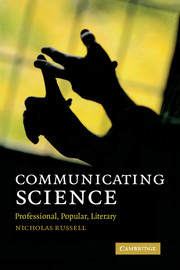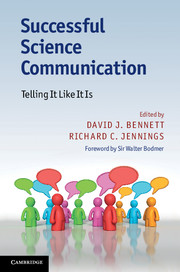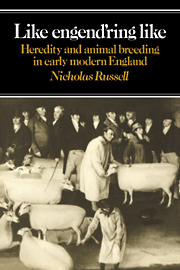Communicating Science
In recent years governments and scientific establishments have been encouraging the development of professional and popular science communication. This book critically examines the origin of this drive to improve communication, and discusses why simply improving scientists’ communication skills and understanding of their audiences may not be enough. Written in an engaging style, and avoiding specialist jargon, this book provides an insight into science’s place in society by looking at science communication in three contexts: the professional patterns of communication among scientists, popular communication to the public, and science in literature and drama. This three-part framework shows how historical and cultural factors operate in today’s complex communication landscape, and should be actively considered when designing and evaluating science communication. Ideal for students and practitioners in science, engineering and medicine, this book provides a better understanding of the culture, sociology and mechanics of professional and popular communication.
- Avoids specialist jargon where possible, so the book can be understood by non-specialists
- Chapters are self-contained, so a particular interest can be addressed by reading a relatively brief chapter
- Each chapter begins with a lively scenario designed to draw readers in by offering stimulating introductions to each topic
Reviews & endorsements
"... a fascinating exploration of past and current trends, with some insight into what the future may hold."
Rachel Zelkowitz, Science News
"This book is most valuable for its broad but organized perspective on science communication and for its wealth of relevant historical and policy information. Rather than easy answers, readers will likely come away with hard questions about how best to proceed in their careers, education, and their lives as people in the service of communicating science. The depth of the author's experience makes for a treatise that is unparalleled in its perspectives on the field of science communication."
Doody's Review Service
"The book provides a great overview of the development of scientific literature and all of its implications, making it a worthwhile read for anyone interested in the publication of scientific results."
Jens Lichtenberg, reviews.com
"Based on the author's considerable research and reflection, this book is both interesting and illuminating. Anyone with even a peripheral interest in science will gain a deeper appreciation of science as a complex dimension of human civilization by reading this work. Highly recommended."
V.V. Raman, Choice Magazine
Product details
November 2009Adobe eBook Reader
9780511636578
0 pages
0kg
This ISBN is for an eBook version which is distributed on our behalf by a third party.
Table of Contents
- Introduction: what this book is about and why you might want to read it
- Prologue: three orphans share a common paternity: professional science communication, popular journalism, and literary fiction are not as separate as they seem
- Part I. Professional Science Communication:
- 1. Spreading the word: the endless struggle to publish professional science
- 2. Walk like an Egyptian: the alien feeling of professional science writing
- 3. The future's bright? Professional science communication in the age of the internet
- 4. Counting the horse's teeth: professional standards in science's barter economy
- 5. Separating the wheat from the chaff: peer review on trial
- Part II. Science for the Public: What Science Do People Need and How Might They Get It?:
- 6. The Public Understanding of Science (PUS) movement and its problems
- 7. Public engagement with science and technology (PEST): fine principle, difficult practice
- 8. Citizen scientists? Democratic input into science policy
- 9. Teaching and learning science in schools: implications for popular science communication
- Part III. Popular Science Communication: The Press and Broadcasting:
- 10. What every scientist should know about mass media
- 11. What every scientist should know about journalists
- 12. The influence of new media
- 13. How the media represents science
- 14. How should science journalists behave?
- Part IV. The Origins of Science in Cultural Context: Five Historic Dramas:
- 15. A terrible storm in Wittenberg: natural knowledge through sorcery and evil
- 16. A terrible storm in the Mediterranean: controlling nature with white magic and religion
- 17. Thieving magpies: the subtle art of false projecting
- 18. Foolish virtuosi: natural philosophy emerges as a distinct discipline but many cannot take it seriously
- 19. Is scientific knowledge 'true' or should it just be 'truthfully' deployed?
- Part V. Science in Literature:
- 20. Science and the Gothic: the three big nineteenth-century monster stories
- 21. Science fiction: serious literature of ideas or low-grade entertainment?
- 22. Science in British literary fiction
- 23. Science on stage: the politics and ethics of science in cultural and educational contexts.






